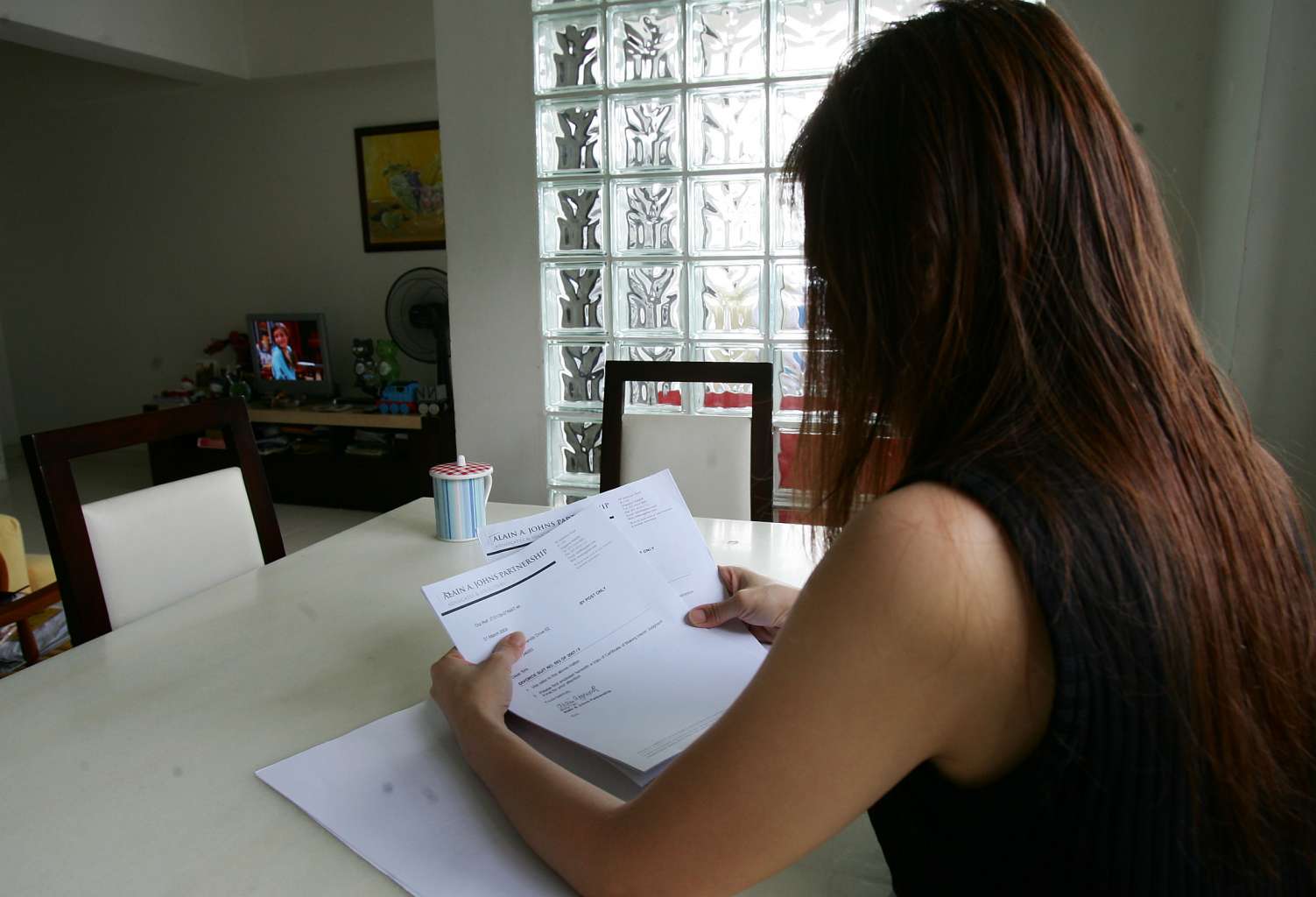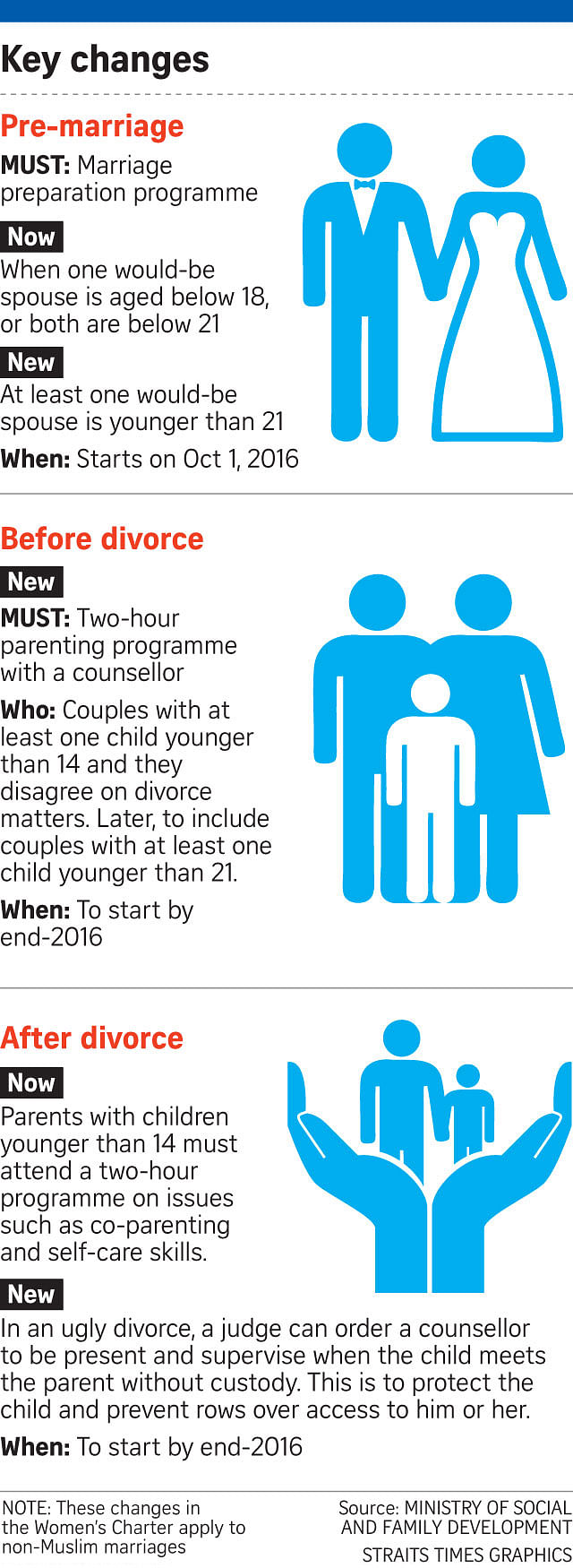Parliament: Move to extend maintenance payments to some men a 'calibrated' measure
Sign up now: Get ST's newsletters delivered to your inbox

Some MPs cautioned that women as a group tend to be more financially vulnerable than men.
PHOTO: ST FILE
Follow topic:
SINGAPORE - Husbands and wives may contribute more equally in the home these days, but women as a group are still more vulnerable than men after a divorce.
This is why Monday's (Feb 29) changes to the Women's Charter allow only one group of men to apply for maintenance from their ex-wife: those who cannot support themselves.
Previously, only women could apply for alimony from their former spouse. Men could not.
Explaining the reasoning behind this change to the law, Minister for Social and Family Development Tan Chuan-Jin said: "While we may review it in future, the proposal to extend maintenance only to incapacitated men is a calibrated measure.
"It strikes a balance at this stage of our societal development," he told the House at the close of the nearly three-hour debate on the changes to the Women's Charter.
The law was prompted by an increase in dual-income families where both the husband and wife work, as well as a small but rising number of wives being the main breadwinner, said Mr Tan.
The 10 MPs who spoke agreed it was fair that incapacitated men be allowed to apply for maintenance, but differed on whether more men should be eligible to do so.
Some argued alimony should be based on need and not on gender.
But others cautioned that women as a group tend to be more financially vulnerable than men.
On the first side of the debate, Non-Constituency MP Daniel Goh argued that the courts should be allowed to decide maintenance based on both parties' contributions to the household and their potential earning power.
Similarly, Ms Lee Bee Wah (Nee Soon GRC), Mr Louis Ng (Nee Soon GRC) and Mr Seah Kian Peng (Marine Parade GRC) argued that men who quit their jobs to become house-husbands should be eligible for maintenance.
Mr Seah called on the Government to recognise the contributions of stay-at-home men and said that while this group may be small, their cause was no less just.
Mr Tan did not say how many incapacitated ex-husbands here would benefit from the change to the law, a question Mr Alex Yam (Marsiling-Yew Tee GRC) had asked.

On the other hand, four MPs said that while women have made much progress since the Women's Charter was enacted in 1961 to protect women, there are still areas where women on the whole lag behind men.
"While many Singaporean women have made good progress over time, this has not been uniform across all groups of women," said Ms Rahayu Mahzam (Jurong GRC).
"While the Ministry takes steps to keep pace with societal changes, there is a need to recognise that the majority of women still lag behind their male counterparts, especially financially," said the family lawyer.
Dr Lily Neo (Jalan Besar GRC) agreed: "We have yet to reach the level of gender equality needed to look at equal rights in all aspects."
She and Ms Jessica Tan (East Coast GRC) noted that the responsibility of care-giving still falls mainly on women, with many putting their jobs on hold to raise their children.
This makes them more financially vulnerable after a divorce, as they might find it harder to find a job after some time out of the workforce.
Ms Tin Pei Ling (MacPherson) also asked if the maintenance payouts would be an extra burden on divorced women already struggling to support their family.
Responding to the MPs, Mr Tan said that there are strict criteria an incapacitated husband must meet before he can apply for maintenance from his ex-wife.
The courts will consider all the circumstances of the case, he added.
This includes the income and earning capacity of the wife, the financial needs of both parties, and the needs of their children.
Ms Sun Xueling (Pasir Ris-Punggol GRC) and Ms Lee also called for the process of maintenance claims to be made less agonising.
Both MPs related the cases of residents they had met, whose ex-husbands refused to pay up even though they could afford to do so.
These women had to spend a lot of time and effort to secure the payouts rightfully due to them, even going to court every few months to get their ex-husband to pay up.
In response, Mr Tan said that the Ministry of Social and Family Development will introduce a new type of officer as part of a tougher stance against maintenance defaulters.
These "maintenance record officers" will help the court assess if someone truly will not or cannot pay the maintenance he owes his former spouse. Firm action will be taken if he is found to be incorrigible, said Mr Tan.
He said: "We intend to stop such irresponsible behaviour."

